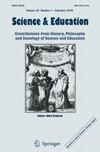A Justification of Legitimate Teleological Explanations in Physics Education
Abstract
Abstract
Scientific teleological explanations cite end states as causes to account for physical phenomena. Researchers in science education have noted that students can use teleological explanations in ways that are illegitimate, for example, by implying that inanimate objects are acting intentionally. Despite such cases, several examples of legitimate teleological explanation have been described, and the use of the explanatory form in several contexts in biological education has been encouraged. We argue that, in addition to those biological cases, teleological accounts that meet two criteria can be a legitimate and valuable tool in physics education. We propose that teleological accounts are legitimate when, first, the account reflects the cause-and-effect relationships that exist in reality and, second, when the end state has a degree of necessity. Our account is based on Lange’s model of constraint-based causality, in which he argues that phenomena can be explained by reference to constraints, necessary restrictions, for example, physical laws, that limit the behaviour of phenomena. We introduce seven examples of constraint-based teleology in the context of physics education and consider to what extent the two criteria are met in each case and hence their legitimacy. Five potential criticisms of the approach are introduced, discussed, and dismissed. Strategies for using legitimate teleological explanations in the physics classroom are proposed.

 求助内容:
求助内容: 应助结果提醒方式:
应助结果提醒方式:


